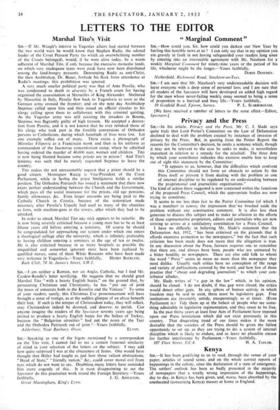Privacy and the Press SIR,—In his article, Privacy and the
Press, Mr. C. J. Slade says quite truly that Lord Porter's Committee on the Law of Defamation declined to deal with the problem created by instances of invasion of privacy by ,the Press. But, in quoting from the Porter Report the reasons for the Committee's decision; he omits a sentence which, though it may not be relevant to the case he seeks to make, is nevertheless important in relation to a remedy for the mischief. The three dots by which your contributor indicates this excision enable him to keep out of sight this statement by the Committee:
"It appears to us, however, that the difficulties which confront this Committee should not form an obstacle to action by the Press itself or prevent it from dealing with the problem as one of internal discipline to be regulated by an understanding between the proprietorial and journalistic organisations."
The kind of action there suggested is now contained within the functions of the proposed Press Council, which the appropriate bodies are now trying to constitute.
It seems to me less than fair to the Porter Committee (of which I was a member) to convey the impression that'we brushed aside the problem without any constructive comment. It is also less than generous to discuss this subject and to make no allusion to the efforts of those representative proprietors, editors and journalists who are now striving to arrive at a satisfactory constitution for a Press Council.
I have no difficulty in believing Mr. Slade's statement that the Defamation Act, 1952, "has been criticised on the grounds that it affords excessive protection to the newspapers," but the fact that such criticism has been made does not mean that the allegation is true. In any discussion about the Press, fairness requires one to remember that there are, and always have been, people who are animated by a bitter hostility to newspapers. There are also odd folk to whom the word " Press " seems to mean no more than the newspaper they most dislike. Usually such critics have no conception of the range and variety of publications covered by the word, and how few of them practise that "cheap and degrading journalism" to which your con- tributor alludes.
Mr. Slade writes of "a gap in the law" which, in his opinion, should be closed. I do not doubt, if that gap were closed, the critics would detect other gaps. In any sphere of human activity in which freedom may be said to exist, there must be legislative gaps. Free institutions are invariably untidy, exasperatingly so at times. (Even Parliament is.) Tidy them up at the behest of people who see some- thing admirable in legislatNe regimentation, and they cease to be free.
In the past thirty years at least four Acts of Parliament have imposed upon our Press restrictions which did not exist previously in this country. That disquieting trend of our times makes it the more desirable that the societies of the Press should be given the fullest opportunity to set up, as they are trying to do', a system of internal discipline which is likely to endure, and so leave no plausible excuse for further interference by Parliament.—Yours faithfully, -






























 Previous page
Previous page